|
It's the end of the season at North Sea Cottages, an isolated woodland retreat for gifted children whose staff appear to outnumber their young charges. Tonight they've all gathered around a fire in the woods and the staff are entertaining the group by telling horror stories. When we join them, lead counsellor T.P. is singing a song of madness and death. When he's finished, the older head counsellor Max lightens the tone by relating the story of Madman Marz, a farmer who went nuts and slaughtered his family in that old abandoned house just over there. When the locals found out what Marz had done, they strung him up to a tree, but when they returned later his dangling corpse had disappeared, as had the bodies of his slaughtered family. Max concludes this cheery tale by warning the group that you should never say the name of Madman Marz above a whisper when out in the woods or he'll come back and get you. You and everyone around you, in fact. So what does the group's cocksure twerp Richie do? At the top of his voice he mocks Marz and challenges him to come out of the woods and get him, then throws a rock through the window of his dilapidated house. Oh man, there's always one.
As T.P. leads the boys back to camp at a trot, Richie spies someone or something watching them from the trees, and becomes so intrigued that he breaks away from the others. None of them notices that he has stayed behind. Oops. When the man-creature up in the branches begins its descent, the logical thing for young Richie to do would be to run away real fast. Not this guy. Instead he wanders up to the Marz house and goes inside to investigate, unaware that Madman Marz – for it is he – has something unsavoury in the basement and is now off in search of fresh victims.
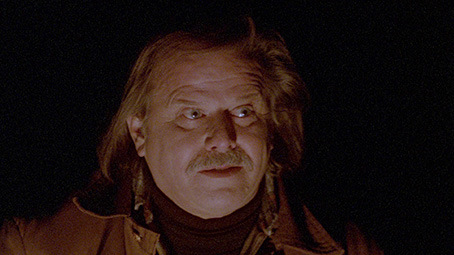
It probably hasn't escaped your notice that, even at this early stage, Madman is piling up the slasher movie clichés like it's hoarding for winter. Madman Marz is even facially disfigured, though not severely enough to require a mask or hood. But in spite of all this, not everything plays out according to the slasher manifesto. The first thing is that there are real actors at work here instead of the mouthy jocks and Barbie dolls that infested a good many of the tackier blights on the genre. Jimmy Steele may overplay Richie's "Oh come on!" mockery of the Marz legend, but scores a bulls-eye when required to react with utter horror to a sight we never see as clearly as his expression suggests we should. Frederick Neumann (credited here as Carl Fredericks) makes for a bewitching storyteller and a likeable lead counsellor, though is not always the sharpest stick in the bundle – when T.P.'s girlfriend Betsy points out that his stories are scaring the small children, he acts all surprised and says, "I hadn't thought of that." What, seriously? Most of the counsellors are solidly performed, and while Jan Claire may play Ellie like a grinning simpleton at times, she really comes through when required to act terrified for her life. I particularly liked Alexis Dubin's naturalistic turn as the level-headed Betsy. Hang about a minute. Alexis Dubin? Who the hell is that? That may be what's on the credits, but Betsy is played by Gaylen Ross, a later documentary filmmaker whose only three film acting jobs consisted of this and key roles in Dawn of the Dead and Creepshow for George Romero. And she's really good here, keeping it low-key in a sub-genre that rarely comprehends the meaning of the term, convincing as a young woman in a position of responsibility and not losing her cool even when events take a lethal turn. I'd certainly trust her with my kids. If I had any, of course.
Madman also kicks against the sub-genre's reputation for showcasing young Americans at their dumbest by having them intermittently use their heads, or at least try to before literally losing them. Thus instead of just flailing about wildly when hung by his neck from a tree, one physically fit unfortunate has the presence of mind to reach up and grab the branch above to take the pressure off his compressed windpipe. And on discovering the head of a fellow counsellor wedged in the engine of the campsite jeep (nice sound effect, by the way), Ellie's boyfriend Bill (played by Alex Murphy – not the one who was shot up and transformed into Robocop) immediately orders the disobedient Ellie to stay in the car, then quickly covers the head and removes it so that they can make a sharp escape. That Marz is on hand to sabotage their efforts on both occasions is par for the course, but at least they tried, goddammit.
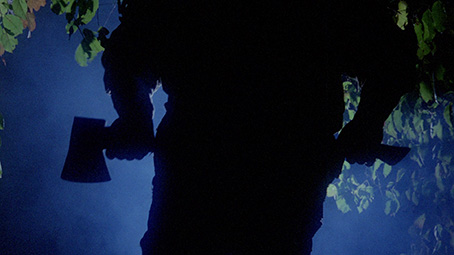
These small but refreshing character smarts are undermined a little by a serious lack of invention in the circumstances that lead to some of the deaths. I mean, having one person killed in the woods whilst out looking for a missing camper is fair enough, but when four in a row get individually slaughtered while searching for an absent companion, usually the one who was killed just before them while doing likewise, it starts to feel a bit like a lethal production line. The requisite failing torches and vehicle whose engine fails at the very worst time also have their catwalk moments, but are at least rather well handled here.
The post-attack makeup effects are not at all bad, and with on-screen flesh wounding effectively ruled out by the low budget (axe blows are shown in close-up as they collide with blood bladders cocooned in wigs or coats), director Joe Giannone instead puts his effort into building the suspense as we wait for the inevitable blade to fall. And he does pretty darned well here, framing the potential victims in long-held and viewpoint restricting close-ups or mid-shots and underscoring the tension with a single ominous synthesiser note. Man, I miss 80s synth driven scores. You may think I'm being sarcastic (what you? never – Ed) but I'm really not. Remember Giorgio Moroder's music for American Gigolo? Or John Harrison's lovely work for Creepshow? And come on, what about the glorious things Vangelis did for the Blade Runner soundtrack? I could go on for hours. Sure, Stephen Horelick's score for Madman is not quite in their league, but it's still pretty funky and effective at creating an aura of menace, and I was singing the final Song of Madman Marz for days after first seeing the film. That said, the warbling love tune that accompanies the seriously overlong hot tub scene I could probably live a long and happy life without ever hearing again.
Madman remains to this day an intriguing concoction. A mid-season entry into the slasher cycle, it sticks to what was becoming the genre template but at the same time merrily plays with expectations. The boy who sets himself up to be the first victim proves to be anything but, and the early identification of a likely Final Girl is used to pull the rug from under our feet in the closing minutes. There are also a spattering of oddly engaging character moments (the slow tilt down and top shot of four of the counsellors lying on the floor as they reflect on the beauty in destruction is a personal favourite), and there's a really good wind-up when Bill and Ellie circle the truck looking for signs of the figure that Ellie is sure she's seen, only to stop just short of a tell-tale spray of blood on the radiator grille.
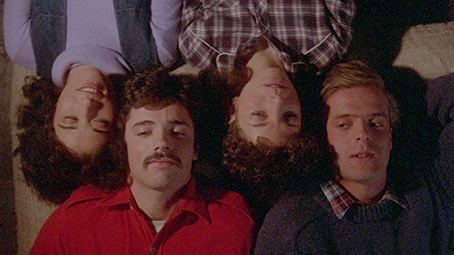
The passing of time and the repetitious nature of the slasher sub-genre has left elements of Madman looking even more clichéd than they did back in '82, but have also helped to highlight where it goes its own entertaining way with the formula. And there's some really good stuff here. The performances and dialogue are above the sub-genre average, James Lemmo's luminous night-time cinematography is classy, and Giannone's direction is assured enough to make you wonder why he never went on to helm another feature. It's unlikely to win many new converts to the cause, but fans of 80s stalk-and-slash horrors who've not previously had the pleasure of Madman Marz's company should definitely pay this particular summer camp a visit.
A vibrant 1.78:1 transfer that shines brightest in the luminous night-time exteriors. The film was shot at night and lit rather than faking it with day-for-night, which ensures that foregrounds are clearly detailed and backgrounds appropriately dark. Black levels in these sequences are rock solid, and the blue tint of the exteriors and warmer interior hues (except in the Marz house, which is toned to look as cold inside as out) are nicely reproduced. The picture is perhaps not Hollywood digital crisp, but the level of detail is still damned good, though there are a few shots where the depth of field appears to have been little more than a micron, pushing parts of the image out of focus. Film grain is quite pronounced in a number of the darker shots, but doesn't feel artificially boosted. A small amount of damage remains, notably a row of short coloured scratches that appear in the middle of the screen on a handful of shots that look uncannily as if they’ve been lovingly stroked by the gloved hand of Freddie Krueger.
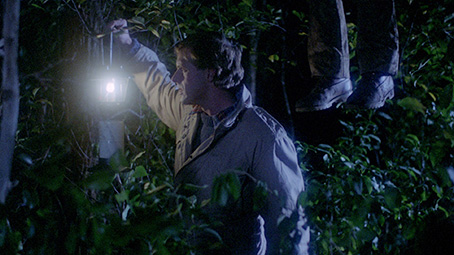
The Linear PCM 2.0 24-bit mono soundtrack is surprisingly rich and clear, with solid dialogue reproduction and crisp rendering of the sometimes yucky sound effects. The bass notes of the synth score sound great.
Optional English subtitles for the deaf and hearing impaired are also available.
The comprehensive collection of extra features here have almost all been sourced from the US Blu-ray from Vinegar Syndrome, while one of those extras – the cast and crew commentary – first appeared on the 2001 US Anchor Bay/Starz DVD release.
First up you can play the film with or without a short but lively Introduction (2:39) by producer Gary Ross and Madman Marz himself, Paul Ehlers. The rest of the extras are covered in the order they appear on the special features menu. Which doesn't mean you should necessarily watch them that way, of course.
The Legend Still Lives! (91:44)
A feature-length retrospective documentary on the making of the film and its subsequent cult following. Technically it has the feel of a patchwork piece in which material from a variety of sources has been pulled together – a couple of the fan interviews have an amateur video feel, there are very visible stutters on some of the shots (standards conversion issues, perhaps?) and occasionally the soundtrack comes close to distorting. Content-wise, however, it's a seriously comprehensive piece. Some of the surviving filmmakers and cast are interviewed about the production, ardent fans explain why they hold the film in such high regard, and Gary Sales and Paul Ehlers return to Fish Cove to explore what's left of their original location. As you might expect, there's a lot of crossover with the other features here, but if you come to this one first then you'll likely learn a lot. It's here I discovered that Ehlers used to get himself in the mood to play Marz by listening to the score for Halloween, and that actor Tony Fish had what is probably the world's one and only sardine museum, which I gather is how he got his name (he was born Tony Nunziata). I'll just bet he was thrilled to bits to be filming at Fish Cove.
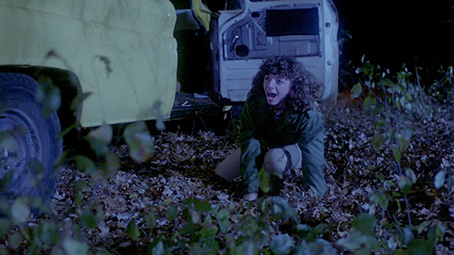
Madman: Alive at 35 (21:01)
Producer Gary Sales and actors Tom Candela and Paul Ehlers meet up at Ehlers' memorabilia-littered house to reminisce about the making of the film. Mostly this takes the form of a dining table chat, which is intercut with a more formal interview with Candela, who recalls staying at Fish Cove, sharing the hot tub with his fellow actors of both gender, shooting a scene that was ultimately cut, and more. There's some crossover with the commentary, but this is still enjoyable.
The Early Career of Gary Sales (14:26)
Producer Gary Sales is interviewed about how he got into the film industry – which began with a chance job on the triple-X porn film It Happened in Hollywood, whose crew also included a young Wes Craven – and the road that led him and fellow film student Joe Giannone to write and eventually make Madman. The sound is a little tinny and picks up the room acoustics, but you can hear what he says clearly enough.
Dead Pit Interviews
Gary Sales (3:38) and Paul Ehlers (5:17) are interviewed at what looks and sounds like a horror convention. Both talk almost exclusively about the proposed remake (which has still failed to appear), which was written by Ehlers' son Jonathan, who was born during the making of the original and hovers here quietly at his father's side.
Music Inspired by Madman (12:39)
The voice of Gary Sales introduces four music tracks that were inspired by the film and its score. A variable bunch, but I did like Escape From Hellview by Deron Miller.
In Memorium (5:48)
Gary Sales pays heartfelt tribute to director Joe Giannone and actor Tony Fish, both of whom have died since Madman was made. It's illustrated with some behind-the-scenes stills, and tailed with a brief nod to the late Fred Neumann, who played Max under the pseudonym of Carl Fredericks.
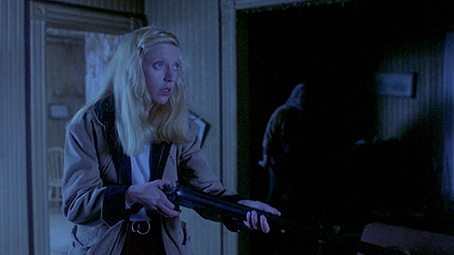
A very neatly edited Theatrical Trailer (1:48) is partnered with five equally nifty TV Spots (1:55 total). Unsurprisingly, there are kill spoilers here.
Stills and Artwork Gallery (7:20)
In a change from the usual gallery format, a rolling slideshow of production stills is accompanied by the voice of producer Gary Sales recalling the making of the film, although if you come to this extra last there will be little you won't have already heard elsewhere.
Commentary by Joe Giannone, Gary Sales, Paul Ehlers and Tony Fish
Recorded in 2001 for the earlier US Anchor Bay/Starz DVD release, this is a seriously valuable companion to the film given that Giannone and Fish are no longer with us. And this track is packed with good stuff, much of it covered elsewhere in the extras but rarely with the same enthusiasm and attention to fine detail as it is here. The boisterous Sales once again leads the way, though is given a run for his money by the upbeat Ehlers and some choice memories of the shoot from Fish and Giannone. Given how much information is relayed here and how much fun it is to listen to, when you get to the extras I'd run this commentary first (I certainly did).
Commentary track by The Hysteria Continues!
Contributors to the horror podcast The Hysteria Continues! provide what is basically a fan commentary track that is probably the biggest casualty to the volume and breadth of extra features on this release, as almost everything discussed here is covered elsewhere, usually in more detail and by those directly involved in the film's production. What did surprise me is the number of times they speculate on things that are confirmed or denied in the cast/crew commentary track, which has been available for 14 years on a DVD that you'd think such ardent fans would have long ago snapped up. They also think that Gaylen Ross's performance is 'flat'. Do me a favour. I enjoyed hearing about their first encounters with the film on VHS, but otherwise I got very little from this track. But that's me.
Booklet
The centrepiece here is a really good essay on the film and its place within the slasher sub-genre by James Oliver, one that highlights
some of the film's strengths as well as taking it to task for copping out on what initially plays like a rejection of the
genre's dubious sexual politics. Also included are notes on the transfer and some large film stills.
Revolutionary it's not, and its does often stick a little too slavishly to the slasher rule book, but Madman is still one of the classier examples of this much-maligned sub-genre. It gets a luxurious release here, with so much bonus material that you'll probably hear almost every story connected with the film something like three or four times. For the horror faithful at least, cheerfully recommended.
|